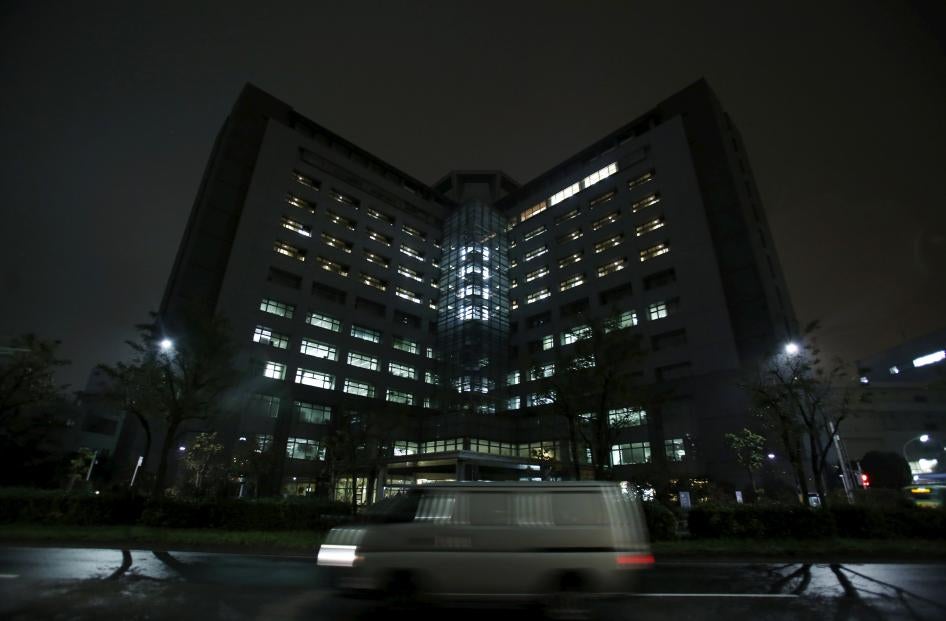Heightened Risk of Refugee Applicants Being Returned Home to Harm
Teppei Kasai
HRW
Program Officer, Asia Division
Program Officer, Asia Division
June 14, 2023

Japan’s Tokyo Regional Immigration Bureau, which includes the Tokyo Detention Center, December 2, 2015. © 2015 Yuya Shino/Reuters
On June 6, just weeks before World Refugee Day, Japan’s Diet passed a bill to amend the Immigration Control and Refugee Recognition Act. The new law allows the Japanese government to deport asylum seekers who apply for refugee status more than twice.
The amendments faced fierce opposition from lawmakers, international legal experts, and civil society organizations. For people seeking refuge in Japan, they will be another obstacle. Japanese policy is already strongly oriented against granting refugee status. In 2022, only 202 people out of 3,772 applicants were recognized as refugees.
In April, United Nations human rights experts criticized the proposed amendments, saying “the absence of appropriate procedural safeguards that explicitly require individual assessment on the circumstances and protection needs prior to deportation, [and] legislative proposals lifting automatic suspension of deportation procedures for asylum seekers ... would undermine international human rights law and the principle of non-refoulement,” which is not returning someone to where their life or freedom would be threatened.
The bill is nearly identical to its predecessor, which was rejected in 2021 following public outcry over the death of a 33-year-old Sri Lankan woman, Ratnayake Liyanage Wishma Sandamali, in an immigration detention center. At the time, UN experts voiced similar criticisms, asking the Japanese government “to respect the principle of non-refoulement.”
Japan’s immigration and refugee policy has long been mired in red tape and unnecessarily restrictive measures. Some refugee applicants are held for prolonged periods in detention centers without judicial oversight, sometimes without adequate access to medical services. Even if they are temporarily released, they are denied work permits or access to basic social services and are prohibited from traveling outside the area of their residence.
Instead of making it harder for asylum seekers seeking refuge from the threat of persecution, the Japanese government should respect the international treaties it has ratified, notably the Refugee Convention and the Convention against Torture. It should end the prolonged detention of refugee status applicants and respect the principle of nonrefoulement.
As recommended by the Japan Federation of Bar Associations, the government should also establish independent bodies to oversee refugee applications and appeals. At the same time, improving procedural safeguards will only help if deportation is suspended for as long as a final review of the asylum application is pending; if Japanese officials recognize an asylum seeker’s refugee claim after the applicant has been sent back to be persecuted, what good will that do?
Japan’s Tokyo Regional Immigration Bureau, which includes the Tokyo Detention Center, December 2, 2015. © 2015 Yuya Shino/Reuters
On June 6, just weeks before World Refugee Day, Japan’s Diet passed a bill to amend the Immigration Control and Refugee Recognition Act. The new law allows the Japanese government to deport asylum seekers who apply for refugee status more than twice.
The amendments faced fierce opposition from lawmakers, international legal experts, and civil society organizations. For people seeking refuge in Japan, they will be another obstacle. Japanese policy is already strongly oriented against granting refugee status. In 2022, only 202 people out of 3,772 applicants were recognized as refugees.
In April, United Nations human rights experts criticized the proposed amendments, saying “the absence of appropriate procedural safeguards that explicitly require individual assessment on the circumstances and protection needs prior to deportation, [and] legislative proposals lifting automatic suspension of deportation procedures for asylum seekers ... would undermine international human rights law and the principle of non-refoulement,” which is not returning someone to where their life or freedom would be threatened.
The bill is nearly identical to its predecessor, which was rejected in 2021 following public outcry over the death of a 33-year-old Sri Lankan woman, Ratnayake Liyanage Wishma Sandamali, in an immigration detention center. At the time, UN experts voiced similar criticisms, asking the Japanese government “to respect the principle of non-refoulement.”
Japan’s immigration and refugee policy has long been mired in red tape and unnecessarily restrictive measures. Some refugee applicants are held for prolonged periods in detention centers without judicial oversight, sometimes without adequate access to medical services. Even if they are temporarily released, they are denied work permits or access to basic social services and are prohibited from traveling outside the area of their residence.
Instead of making it harder for asylum seekers seeking refuge from the threat of persecution, the Japanese government should respect the international treaties it has ratified, notably the Refugee Convention and the Convention against Torture. It should end the prolonged detention of refugee status applicants and respect the principle of nonrefoulement.
As recommended by the Japan Federation of Bar Associations, the government should also establish independent bodies to oversee refugee applications and appeals. At the same time, improving procedural safeguards will only help if deportation is suspended for as long as a final review of the asylum application is pending; if Japanese officials recognize an asylum seeker’s refugee claim after the applicant has been sent back to be persecuted, what good will that do?
No comments:
Post a Comment